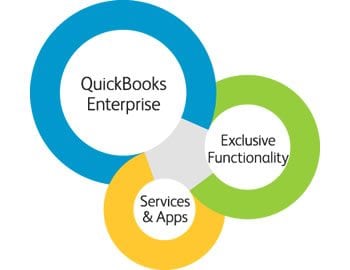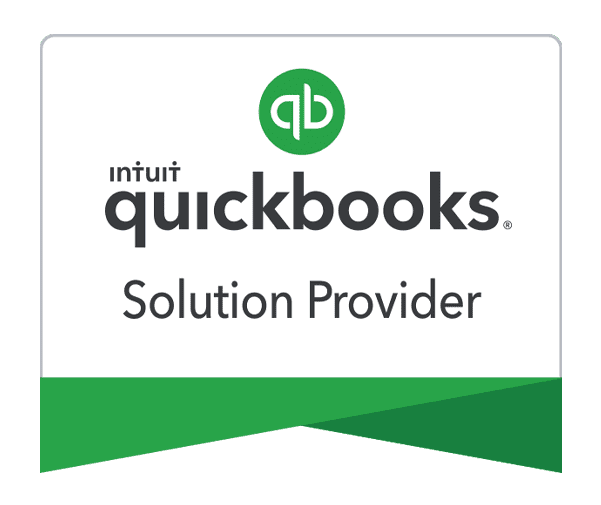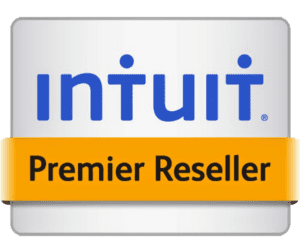
Pete Real
QuickBooks has long enjoyed a reputation as one of the easiest accounting software packages to use, particularly for non-accountants. At one time, in fact, some almost viewed it as somehow not “real” accounting software. Those days are long gone, however. QuickBooks Pro and Premier are widely used by small (and not-so-small) businesses, and in response accountants have widely adopted the systems; Intuit even has an Accountant version of QuickBooks specially designed for those who support clients running QuickBooks. QuickBooks Enterprise, however, takes the software to a new level, and plenty of not-so-small businesses now use it. Thanks to its scalability in price based on user licenses, many smaller companies have moved from Pro or Premier to Enterprise as well. How can you tell whether it’s time to make the jump? Here are our top ten reasons to upgrade to QuickBooks Enterprise.
- Your business has grown to the point that you need more than the maximum three (for Pro) or five (for Premier) users. QuickBooks user limits are based on the number of people simultaneously accessing the same company file, not some absolute number of users or seats, which is both flexible and cost-effective. QuickBooks Enterprise is available for any number of users from one to ten or in a 30-user version.
- Your staff is large and varied enough that you need detailed control over user permissions. You probably don’t want your data entry clerk examining everyone’s salary data in the payroll module or writing checks from your operating account. QuickBooks Enterprise provides the ability to set extremely specific permissions for each user, and you can create permission profiles for specific roles in order to avoid having to repeat the process for similar employees.
- Your business is made up of more than one legal entity. It’s very common these days to split business operations among multiple corporations or LLCs, even for relatively small businesses with a single owner. This means multiple sets of books, and probably a fair number of intercompany transactions. Only QuickBooks Enterprise allows you to have two company files open simultaneously, which is a tremendous time saver in such situations.
- Your business has outgrown your existing accounting software. QuickBooks Enterprise is robust enough to handle far more names and items than other versions—more customers, more inventory items, more vendors, more employees. It allows up to one million names (customers, vendors, employees) and up to one million list items (inventory, non-inventory, and service items).
- Your fixed assets have become so extensive that they’re difficult to manage. Different asset classes have different useful lives (as defined by the tax code). Depreciation must be backed out when an asset is sold or otherwise disposed. You need to know the basis (original value) for every fixed asset your business owns. QuickBooks Enterprise solves these problems with Fixed Asset Manager, which simplifies the tracking of your fixed assets without having to resort to a cumbersome non-integrated solution like paper records or a spreadsheet, or reliance on your accountant’s depreciation schedules.
- You can no longer afford to have users locked out of the accounting system for long periods. QuickBooks Enterprise expands the number of activities that can be performed in multi-user mode. Moreover, less capable versions tend to bog down badly when one user is performing a data-intensive operation like reporting, but the database management components of Enterprise eliminate this problem.
- Your reporting and analysis needs have become increasingly complex. QuickBooks Enterprise already features over 150 built-in, industry-specific reports, but the ODBC-compliant reporting module allows the creation of a tremendous range of custom reports. Better yet, adding the optional Advanced Reporting module to QuickBooks Enterprise 2015 enables users to easily create highly customized reports without the need for technical knowledge of databases.
- You need to create consolidated reports for multiple entities. If your business is made up of more than one legal entity, the only way to create consolidated financial statements or reports was by manually combining them in a spreadsheet. QuickBooks Enterprise has consolidated reporting built in, and it’s extremely easy to use.
- You accept credit cards through your accounting software. Intuit offers preferred processing rates for Enterprise users who accept credit cards through QuickBooks.
- Your business is inventory-intensive. Inventory management can quickly become an accounting nightmare without the right tools. In addition to its robust item list limits, QuickBooks Enterprise 2015 offers the optional Advanced Inventory module. This set of powerful tools makes available bin location tracking, serial number or lot tracking, bar code scanning, multi-location inventory tracking, FIFO (first in, first out) costing, and a powerful pricing tool that automates much of the price management process.
Although much has been made of the move to cloud accounting solutions, including Intuit’s own QuickBooks Online, the company continues to invest in the development of Enterprise. The 2015 version includes numerous enhancements that were not made to Pro or Premier, and in late 2014 Intuit brought all customer care operations for QuickBooks Enterprise back to the U.S. Besides, if a cloud solution is right for your business, hosting is available for QuickBooks Enterprise that provides the same benefits—automatic data backups, automatic software upgrades, access from anywhere with an internet connection, and so forth. There has never been a better time—or more reasons—to upgrade to QuickBooks Enterprise.
Have Questions? Need Help?
Are you starting to outgrow your QuickBooks Pro, Premier, or Online or do you still have more questions on QuickBooks Enterprise? If so, we are here to help. Just give us a call at 866-949-7267 or click here to send us an email. We will work with you help decide the best software fit for both you and your business.
- advanced inventory included in quickbooks enterprise 2015advanced reporting quickbooks 2015benefits in quickbooks enterprise 2015compare quickbooks enterprise 2014 and 2015compare quickbooks premier and quickbooks enterprisecompare quickbooks pro to quickbooks enterpriseEnterprise 2015 BenefitsEnterprise Gold Package SubscriptionEnterprise Platinum Package SubscriptionEnterprise Silver Package Subscriptionhow does quickbooks advanced pricing worknew features in quickbooks enterprise 2015New QuickBooks Enterprise 2015QuickBooks Advanced InventoryQuickBooks Advanced PricingQuickBooks Advanced ReportingQuickBooks Enterprise 2015 FeaturesQuickBooks ERP Softwarequickboooks enterprise 2015 advantageswhat are the benefits of quickbooks advanced pricingwhat are the features of quickbooks advanced pricingwhat does quickbooks advanced pricing dowhat is quickbooks advanced pricingwhy should i upgrade to quickbooks enterprisewhy upgrade to quickbooks enterprise 2015
















